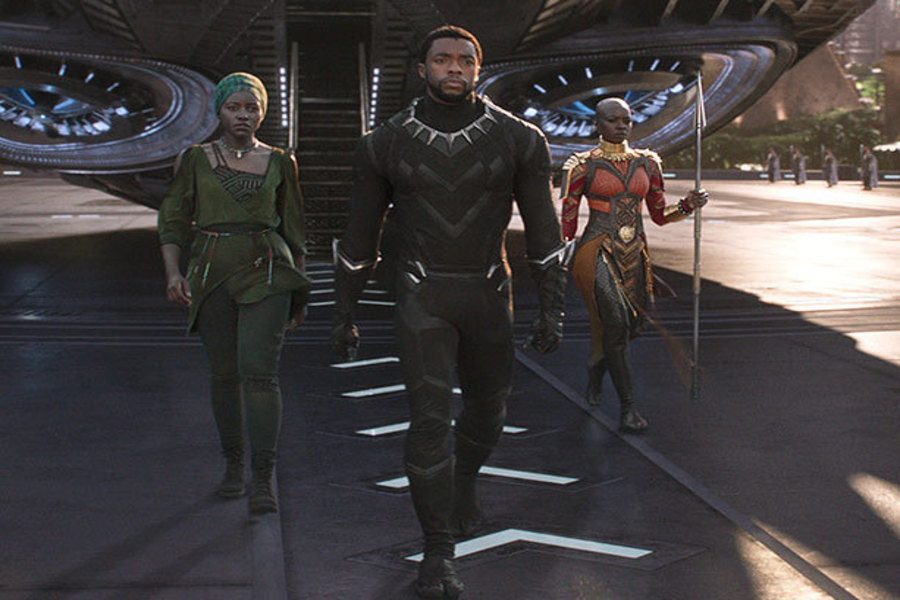REVIEW: With cast and plot, ‘Black Panther’ leaps over Hollywood barriers
March 5, 2018
The world has seen many superhero movies. Black Panther is much more.
The 18th movie in the Marvel Cinematic Universe — a series of movies based on Marvel comic book characters — director Ryan Coogler’s depiction of the African superhero is a refreshing and groundbreaking masterpiece that addresses huge worldwide issues with sympathy, insight and hope.
Revolutionary in everything from its story line and geographic focus to its casting, it tells the story of T’challa — the Black Panther, first created by Marvel in 1966 but downplayed with the rise of a political movement by the same name — who is a prince of the fictional country of Wakanda, and has recently ascended to the throne following the assassination of his father.
Wakanda is a beacon of advancement not in a past or future vision of America or in outer space but in the middle of Africa. It is a theoretical nation that was never colonized, but rather ruled by African leaders and possessing a vibrant history and culture. The nation is also rich, due to its surplus of vibranium, a rare metal with magical properties.
The movie’s antagonist is named Erik Killmonger, played by Michael B. Jordan. Smooth talking and quick-witted, this fiery character joins the ranks of the best villains in movie history. Unlike the classic supervillain, Killmonger — born N’Jadaka — is not motivated by evil. He plays the complex role of an anti-villain, one with respectable intentions but who uses destructive means to accomplish them. His struggle with T’challa represents two opposing strategies for defeating oppression.
Killmonger grew up outside of the Wakandan utopia, in Oakland, California, and experienced the struggles of black Americans, all the while knowing of the riches in Wakanda from his Wakandan father, N’Jobu. After N’Jobu is murdered, N’Jadaka is left alone and with no connection to Wakanda but the stories he remembers.
Eventually, N’Jadaka comes to the conclusion that it is Wakanda’s responsibility to help disadvantaged people everywhere who share African ancestry. He trains for years as a soldier and mercenary, earning the nickname Killmonger and plotting to return to his homeland to take the throne from T’challa — not for the power and glory though, but for a genuinely moral cause.
But to do it, he wants Wakandan secret operatives around the world to overthrow major governments, resulting in massive casualties.
This challenge spurs T’challa’s development throughout the film. At first, T’challa is certain that his role as king is to protect the sanctity of his kingdom that has existed for ages. Echoing a common nationalist aphorism, Wakandans are afraid that allowing foreigners into their community will contaminate their culture. Through Killmonger’s difficult truths, T’challa learns the importance of helping others despite its possible consequences.
Thus in its two hours and 15 minutes, Black Panther manages to confront a range of modern issues — cultural appropriation, the responsibilities of a nation, the flaws of nationalism, and combating racism.
All but two major characters are played by Africans or African-American, setting a new mark in superhero film history. T’challa himself is played by Chadwick Boseman, who fills him with strength with humility and creates a character more like a real person and less cartoonish than the usual superheroe.
Along with the stars, standouts are Shuri, T’challa’s sister, played by Letita Wright, and W’Kabi, his childhood friend, played by Daniel Kaluuya. Shuri provides comic relief in the movie with a sense of humor for the iPhone generation, while W’Kabi provides T’challa with difficult yet needed criticism and becomes an agent of change for the young king.
Taken together, they crush a long-held Hollywood claim that the severe lack of minority stars in major films was not caused by bias but by economic considerations — the idea that films with black leads would not sell. With a $201.7 million opening weekend in North America, Black Panther had the biggest February opening weekend and the fifth biggest ever. It’s a Hollywood mainstream production that appeals to all audiences.
It may be uncomfortable for white audiences going to a superhero movie and barely seeing anyone who looks like them. That feeling is what minority children experience almost any time they visit the movies. White people take representation in popular culture for granted.
Literally every other Marvel movie’s main character is white. African-American children have only been able to see themselves reflected in minor superhero characters, like Falcon in Captain America: The Winter Soldier, Nick Fury in The Avengers and War Machine in Iron Man. If superheros are supposed to be inspirational, it is intolerable that for years Marvel has said that African American children can aspire to play merely supporting roles.
Black Panther is a strong black hero and the unquestioned star of his own film.
There is no bountiful African state like Wakanda in the real world. Colonization disrupted the ancient social structure that had shaped Africa and resulted in the cycles of poverty and war we see now. But Black Panther is not only attempting to show what could have been if colonization had not occured. It makes the point that anyone can shine as bright as Wakanda if given an opportunity.
It makes that point many ways — including that fact that the film itself is like none before it, and will undoubtedly be looked back on as a turning point for representation in not only superhero flicks but all major films.














